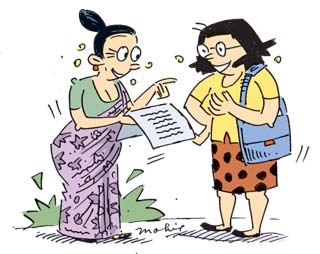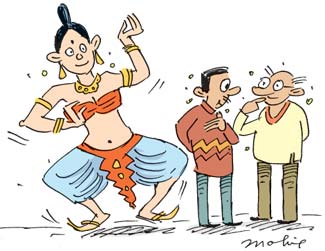|
 by
R. S. Karunaratne by
R. S. Karunaratne
'Well':
A useful word in speech and writing
'well' is both an irregular adjective and an adverb.
It is also used as a discourse marker.
|

Betsy writes well. |
1. We use 'well' to talk about things done in a good way.
The army handled the situation in the north very well.
Amaradeva sings well.
Betsy writes well.
His lawyer argued the case very well.
Nayana behaved well at the party.
2. We use 'well' to express strong possibility.
The chairman may well have signed the papers.
Nurse: Who is screaming in the ward?
Pupil nurse: That may well be the patient admitted today.
3. We use 'well' to talk about a person's health.
A: Are you well, Samson?
B: I think I'm better now.
Patient: I may have to stay here for a few more days.
Visitor: But you look well.
4. We use 'well for emphasis.
The ruling party is well on the way to
victory.
Father returned home well after midnight.
Apply for the vacancy well in advance.
She is well over 50 years.
I'm well over 60 kilogrammes.
Collocations
We use 'well' frequently with certain words.
You're quite well, aren't you?
He does his work very well.
She drives rather well.
Narmada speaks English fairly well.
Susila dances pretty well.
|

Susila dances pretty well. |
We use 'well' in compound adjectives.
The director delivered a well prepared speech.
Edith is doing a well paid job.
Suranimala is a well built young man.
A well dressed man sat next to me.
Shakespeare is a well-known dramatist.
After winning the lottery prize, now she is well off.
Sigiriya is well worth visiting.
We are well aware that the minister is doing a good job.
6. Set phrases
Please give me a good dictionary and a thesaurus as well. (in
addition to)
You would do well to get a second opinion before surgery. (giving
advice)
The train is late. I might as well travel by bus. (no other choice)
The floods devastated the area well and truly. (totally)
7. We use 'well' as a discourse marker.
Well that's all for the day.
Well, what you say is correct.
Fun with proverbs
Proverbs are witty sayings coming down to us from the past. By using
them we can put our thoughts across to others in the most delicate
manner. Be familiar with the following probers and their meanings.
1. It's love that makes the world go
round.
When you are in love, the world and everything in it looks beautiful.
It is worth living in a beautiful world.
2. Jam tomorrow
Jam is something we love to eat. The proverbs means promising
something good for tomorrow. However, another proverb says, Tomorrow
never comes.
3. A job worth doing is a job worth doing well.
The meaning is quite obvious. If you consider that a job should be
done well, do it well.
4. Keep a dog and bark
oneself
Sometimes you employ another person to do a particular job. If he
does not do it, you have to do it yourself.
5. Keep the wolf from
the door.
Here the wolf symbolises poverty and hunger. To keep the wolf away
from the door you have to do a job and earn money.
6. Kill two birds with
one stone
Sometimes you can achieve two different objectives with one single
action or decision.
7. Know a hawk from a
handsaw.
The proverb applies when you know what you are doing or talking
about.
8. Laugh and the world
laughs with you.
Laughter is infectious. In other words, when you are happy, others
too will be happy.
9. Laughter is the
best medicine.
People who are cheerful are usually healthy.
10. A leopard cannot
change his spots
People cannot change their basic nature, however much they try. That
is why we have hot tempered and cheerful people in our midst.
11. Let sleeping dogs
lie
It is advisable not to mention certain things to a person if those
things are likely to upset him.
12. Life is just a
bowl of cherries
The proverb has a positive and negative meaning. When you have
everything you need, life is a bowl of cherries. On the other hand when
you do not get your promotion or something you need you can say
sarcastically that life is a bowl of cherries.
13. Light not a candle
to the sun.
Do not try to advise an expert on a particular subject.
14. A light purse
makes a heavy heart.
When your purse is empty you are unhappy because you cannot buy what
you want.
15. Lightning never
strikes in the same place twice.
It is unlikely that something bad would happen to the same person
twice.
Starters :
Simple future tense
We use future tense to indicate future action.
I will do it tomorrow.
Students will sit the final examination in December.
The employees will attend a seminar on Monday.
The rain will cease after some time.
|

I will meet you tomorrow. |
The train will reach Anuradhapura at 5 p.m.
The future form is formed in the following way.
Will + base form of the verb.
Mary will write the essay tomorrow.
Will + base form of the verb 'to be'
I will be busy in office throughout the week.
The document will be ready in two hours.
The police will be on the alert for possible trouble makers.
To indicate future action that is planned, we use 'going to' form.
Formula: Present tense of the verb 'to be' + going to + base form of
verb
The police are going to file action against the suspect.
The girls are going to dance at the concert.
In the past, the simple future tense was formed using 'shall' and 'will'.'Shall'
was used for 'I' and 'we'. 'Will' was used for other nouns and pronouns.
However, in modern English 'will' is used for all nouns and pronouns.
There are exceptions.
Shall I come with you?
Shall we dance?
In these sentences 'shall' cannot be replaced by 'will'.
Some grammarians draw a distinction between 'shall' and 'will'.
I shall meet you tomorrow. (not definite)
I will meet you tomorrow. (definite)
Activity
State whether the following sentences are right or wrong. If wrong,
correct it.
Check your answers with the key.
1. She go out for lunch today.
2. Harsha returns home for the vacation.
3. I will in India next Saturday.
4. Mala going to attend a function tonight.
5. Ira is going to visit her father tomorrow.
6. We clean the house for the coming new year.
7. Everyone goes to do different things today.
8. I remember you for a long time.
9. Will we hire a taxi?
10. I ask father for some money.
**************
[Key]
1. Wrong. She will go out for lunch today.
2. Wrong. Harsha will return home for the vacation.
3. Wrong. I will be in India next Saturday.
4. Wrong. Mala is going to attend a function tonight.
5. Right.
6. Wrong. We will clean the house for the coming new year.
7. Wrong. Everyone is going to do different things today.
8. Wrong. I will remember you for a long time.
9. Wrong. Shall we hire a taxi?
10. Wrong. I will ask father for some money. |

